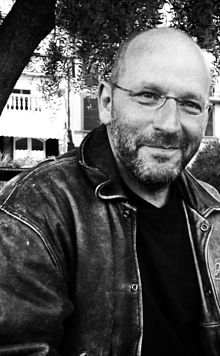Robert Schneider (writer)
Robert Schneider (born June 16, 1961 in Bregenz , Vorarlberg ) is an Austrian writer . Schneider has published six novels, a short story, some plays and two volumes of poetry.
life and work
Robert Schneider was adopted by the mountain farmer couple Anton and Stephanie Schneider when he was two years old and grew up in Götzis (Vorarlberg), where he still lives as a freelance writer today. He is married and has three children.
From 1981 to 1986 Schneider studied composition, theater studies and art history in Vienna. He broke off his studies to become a writer, worked as a tour guide and organist, and kept himself afloat with various literary grants.
He published his debut novel, Schlafes Bruder , in 1992 by Reclam-Verlag (Leipzig) after the manuscript had previously been rejected by 24 publishers. The book, which tells the fictional story of the musician Johannes Elias Alder, who takes his own life through sleep deprivation, became an international success, has so far been translated into 36 languages and has found its way into the school canon. In 1995 the novel was made into a film under the direction of Joseph Vilsmaier , the film was nominated for a Golden Globe in 1996. The novel served as a template for a ballet, an opera and several drama versions.
In 1998 his second novel, Die Luftgängerin, was published . The novel describes the rise and fall of the fictional city of Jakobsroth in the Vorarlberg Rhine Valley. The book was unanimously and unprecedentedly panned by German literary criticism.
In the meantime, Schneider lived in New York to work on the third part of his Rhine Valley trilogy , the novel The Untouched , which appeared in 2000. In it, based on a historical event, he describes the fate of two peasant children who were sent to America at the time of the Great Depression.
His novel Kristus tells the life of the "Baptist King" Jan Beukels, who founded the Kingdom of Münster . The presentation is based heavily on the sources, the language sounds ancient.
As far as the literary classification is concerned, Schneider is a controversial figure in contemporary German-language literature. His books alternate between an artificial language based on musical parameters, which mixes the ancient, the modern and his own linguistic inventions ( Schlafes Bruder , Die Luftgängerin , Kristus ), and a terse, almost stenographic writing style ( dirt , shadow ). The contradiction between the emotionality and the calculation of his narration is difficult to incorporate into common typing patterns. He himself sees his roots in the tradition of Austrian storytelling before 1945.
In the past few years he withdrew as a person from the literary public. He rarely gives interviews: “Everything a writer says about his books can only be disturbing. You have to go your way without him. "
His last novel to date, The Revelation , was published in September 2007 . It tells the story of a Bach discovery made by a music researcher from Naumburg (Saale) , whose life is thrown out of joint as a result. Robert Schneider regularly publishes autobiographical observations in the Sunday editions of the Kronen Zeitung .
Awards
- 1990: State award for folk theater pieces , for dream and grief of young H.
- 1993: Prize of the Potsdamer Theatertage, for dirt - About the fear of the foreign
- 1993: Alemannic Literature Prize
- 1993: Robert Musil grant from the City of Vienna
- 1994: Literature Prize of the Salzburg Easter Festival
- 1994: Prix Médicis Étranger
- 1994: Premio Grinzane Cavour
- 1994: Civis radio play award from WDR
- 1995: Marieluise Fleißer Prize
- 1995: Premio Itas del Libro di Montagna (Trento)
- 2008: Fantastic Prize of the City of Wetzlar for The Revelation
Works
prose
- Sleep brother . Novel. Reclam , Leipzig 1992, ISBN 3-379-01518-0 .
- The airwalker . Novel. Blessing , Munich 1998, ISBN 3-442-72578-X .
- The untouched . Novel. Albrecht Knaus Verlag , Munich 2000, ISBN 3-8135-0161-2 .
- The Pope and the girl . Novella. Reclam, Leipzig 2001, ISBN 3-379-00781-1 .
- Shadow . Novel. Reclam, Leipzig 2002, ISBN 3-379-00792-7 .
- Kristus . Novel. Aufbau-Verlag , Berlin 2004, ISBN 3-351-03013-4 .
- The revelation . Novel. Aufbau-Verlag, Berlin 2007, ISBN 978-3-351-03212-8 .
Texts for the theater
- Hitler my. A love speech. Premiere: 1989, Götzis, Alte Krone
- Old days. Comedy. Premiere: 1994, Götzis, Am Bach
- Filth . Monologue about fear of the stranger. Premiere: 1993, Thalia Theater (Hamburg)
- Dream and grief of young H. Eleven stations. Premiere: 1993, Hanover Theater
- Comedy of homesickness in Germany. Premiere: 1999, Schauspielhaus Zurich
Poetry
- Counter prayer . 1992, Provincial Library , Weitra 1995.
- eight awards . 2005, Mitteldeutscher Verlag , Halle (Saale) 2006.
Web links
- Literature by and about Robert Schneider in the catalog of the German National Library
- Short biography and reviews of works by Robert Schneider at perlentaucher.de
Individual evidence
- ^ Ivana Moser: Critical analysis of the works of Robert Schneider . Dissertation, University of Milan, 2009, p. 32 ff.
- ↑ Saur Miachael: One from the village . In: Süddeutsche Zeitung Magazin , October 13, 1995.
- ↑ Klaus-J. Frahm: Fantastic Prize to Robert Schneider . In: Oberhessische Zeitung , December 6, 2007.
- ^ Alemannic Literature Prize. City of Waldshut-Tiengen, accessed on May 15, 2013 .
| personal data | |
|---|---|
| SURNAME | Schneider, Robert |
| BRIEF DESCRIPTION | Austrian writer |
| DATE OF BIRTH | June 16, 1961 |
| PLACE OF BIRTH | Bregenz |

